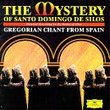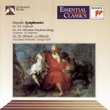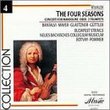| All Artists: Nikolaus Harnoncourt, Chamber Orchestra of Europe Title: Schumann: Symphonies 3 "Rhenish" & 4 (First version, 1841) Members Wishing: 0 Total Copies: 0 Label: Elektra / Wea Release Date: 11/1/1994 Genre: Classical Style: Symphonies Number of Discs: 1 SwapaCD Credits: 1 UPC: 745099086725 |
Search - Nikolaus Harnoncourt, Chamber Orchestra of Europe :: Schumann: Symphonies 3 "Rhenish" & 4 (First version, 1841)
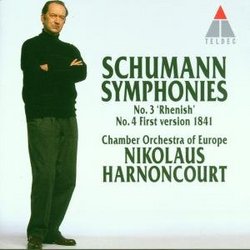 | Nikolaus Harnoncourt, Chamber Orchestra of Europe Schumann: Symphonies 3 "Rhenish" & 4 (First version, 1841) Genre: Classical |
Larger Image |
CD DetailsSimilarly Requested CDs
|
CD ReviewsSchumann thrives under Harnoncourt's quirky ideas Santa Fe Listener | Santa Fe, NM USA | 12/20/2005 (5 out of 5 stars) "Since he cannot approach a composer without rethinking his music, it's hit-and-miss with Harnoncourt's interpretations. In the case of Schumann's Fourth Sym., the new idea is twofold: first, Harnoncourt believes that the 1841 first version is preferable to the revised one played by every other conductor (including himself, with the Berlin Phil. on another Teldec CD), and second, he sees the Fourth as a chamber symphony. As far as a listener is concerned, the origianl version of the Fourth is much leaner, more transparent, and often melodically different, to the extent that it sounds like a newly discovered work. In a nod to period style Harnoncourt has the strings play with a minimum of vibrato (a bit odd since his phrasing is often ultra-romantic). Using the smaller forces of the Chamber Orch. of Europe allows Harnoncourt to emphasize inner detail and counterpoint. But far more noticeable, in the Fourth as well as the Rhenish Sym., is the conductor's smoothed-out accents, the absence of surging passion, and a tendecy toward dream-like legato and lots of unmarked push-and-pull with the tempo. Harnoncourt's rationale is that the music should sound totally spontaneous to reflect the amazing speed at which the composer worked--Schumann could complete an entire symphony in a few weeks when the frenzy of inspiration struck him. I'm not sure that speed of composition makes any difference to performance style, but in any case Harnoncourt looses all the stops. This is rhapsodic music-making without apology. Literalists will find it maddening--certainly no one else comes close among standard recommendations--but I heard these as extremely sympathetic readings. Be prepared for strangeness." An Interesting, Often Intriguing Set Of Interpretations From John Kwok | New York, NY USA | 06/02/2007 (5 out of 5 stars) "Without a doubt, Nikolaus Harnoncourt is one of our most inspired, intellectually thoughtful, conductors. His elegant interpretations of Schubert's symphonies and of Beethoven's too, have earned much ample praise from critics and fans alike. Originally interestedin Baroque and Classical Music, Maestro Harnoncourt has lately made over the past decade a series of truly compelling recordings of some of the most important compositions from noted 19th and 20th Century composers ranging from Brahms and Dvorak to Bruckner and Bartok. However, I can't say that I would regard this early 1990s recording as one of his finest, even though there is still enough to admire from it for me to bestow upon it highest honors. At first glance Harnoncourt and his small orchestral ensemble have made a fascinating, period instrument-influenced recording which emphasizes Schumann's underrated strengths as an orchestral arranger, in two exceptionally well-played performances of the ever popular 3rd "Rhenish" Symphony and the original version of the 4th Symphony, dating from 1841, a year after he composed his stirring, almost jubilant, 1st Symphony.
My major reservation about this recording is Harnoncourt's lack of emphasis on strong, emotional accents in both symphonies, as though composing both works were relatively rational exercises which Schumann practiced eagerly (We know now from his amply documented mental history that the composition of these symphonies were far from trivial exercises steeped in rational thinking.). These are interpretations which have emphasized almost to the exclusion of everything else, both brisk tempi and lighter orchestral textures (In stark contrast to notable recordings from conductor as emotionally dissimilar to each other as David Zinman, Daniel Barenboim, Rafael Kubelik, and Leonard Bernstein for example.). So I have to recommend to those thinking of purchasing this recording that they should regard it as a viable, fascinating alternative to others from the conductors I have mentioned; it is not the definitive recording I was hoping for from Harnoncourt and The Chamber Orchestra of Europe." |

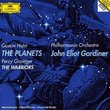
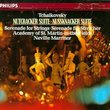

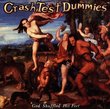

![The Diary of Alicia Keys [Limited Edition w/ Bonus DVD]](https://nationalbookswap.com/cd//m/52/7552/667552.jpg)

